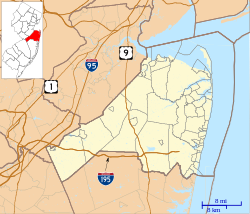Dr. Robert W. Cooke Medical Office | |
 | |
| Location | 67 McCampbell Road, Holmdel Township, New Jersey |
|---|---|
| Coordinates | 40°20′44.5″N74°10′19.7″W / 40.345694°N 74.172139°W |
| Built | c. 1823 |
| Architectural style | Federal |
| NRHP reference No. | 10001145 [1] |
| NJRHP No. | 4972 [2] |
| Significant dates | |
| Added to NRHP | January 18, 2011 |
| Designated NJRHP | November 17, 2010 |
The Dr. Robert W. Cooke Medical Office is located at 67 McCampbell Road in Holmdel Township in Monmouth County, New Jersey, United States. Built around 1823, the historic Federal style building was documented by the Historic American Buildings Survey (HABS) in 1940. [3] It was added to the National Register of Historic Places on January 18, 2011, for its significance in architecture and health/medicine. [1] [4] It is now owned by the Holmdel Historical Society. [5]




